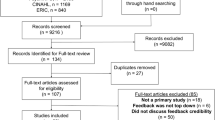Abstract
Mistakes in clinical practice may have life-or-death consequences for patients. Training in how to give and receive feedback has been emphasized in medical education for decades, yet medical practitioners continue to struggle with these practices. Giving feedback is difficult because it is not easy for a receiver to receive feedback. Current training programs lack an in-depth understanding of the causes of why receiving feedback is not easy. The purposes of this article are to (1) fill this gap by identifying the shared weaknesses in human nature as the causes underlying the difficulty in receiving feedback, especially criticism, using a cognitive approach; (2) develop logical principles to treat the identified causes; (3) show the shared common wisdom of how to receive criticism through a multicultural approach; and finally, (4) address how these cognitive and multicultural approaches may facilitate receiving criticism in the field of medical education.

Similar content being viewed by others
References
Algiraigri AH. Ten tips for receiving feedback. Med Educ Online. 2014;19:25141.
Anderson PAM. Giving feedback on clinical skills: are we starving our young? J Grad Med Educ. 2012;4(2):154–8.
Subha Ramani FAMEE, Könings KD, Shiphra Ginsburg FRCPC, van der Vleuten CPM. Feedback redefined: principles and practice. J Gen Intern Med. 2019;34(5):744–9. https://doi.org/10.1007/s11606-019-04874-2.
Bing-You RG, Bertsch T, Thompson JA. Coaching medical students in receiving effective feedback. Teach Learn Med. 1998;10:228–31.
Hewson MG, Little ML. Giving feedback in medical education. J Gen Intern Med. 1998;13:111–6.
Sargeant J, Mann K. Feedback in medical education: skills for improving learner performance. In: Cantillon P, Woods D, editors. ABCs of learning & teaching in medicine. Hoboken: Blackwell Publishing; 2010. p. 29–32.
Kost A, Combs H, Smith S, Klein E, Kritek P, Robins L, et al. A proposed conceptual framework and investigation of upward feedback receptivity in medical education. Teach Learn Med. 2015;27(4):359–61.
Bing-You R, Ramesh S, Hayes V, Varaklis K, Ward D, Blanco M. Trainees’ perceptions of feedback: validity evidence for two FEEDME (feedback in medical education) instruments. Teach Learn Med. 2017;14:1–11.
Weaver GA. The art & science of accepting criticism [training materials]. Livonia: American Society of Employers; n.d.
Galotti KM. Cognitive psychology in and out of the laboratory. 4th ed. Stamford: Thomson Wadsworth; 2008.
Kandel ER, Schwartz JH, Jessell TM, Siegelbaum SA, Hudspeth AJ. Principles of neural science: part VII: the unconscious and conscious processing of neural information. New York: McGraw-Hill Medical; 2013.
Lao-Tze. Te-Tao Ching. A new translation based on the recently discovered Ma-wang-tui texts. Henricks RG, trans. New York: Ballantine Books; 1989. p. p85.
Peale NV. The power of positive thinking. New York: Prentice-Hall; 1952.
Martin K. Winston Churchill interviewed in 1939: The British people would rather go down fighting. New Statesman [Online archive]. 1939. Available at https://www.newstatesman.com/archive/2013/12/british-people-would-rather-go-down-fighting. Accessed 28 Nov 2018.
Yeager DS, Purdie-Vaughns V, Garcia J, Apfel N, Brzustoski P, Master A, et al. Breaking the cycle of mistrust: wise interventions to provide critical feedback across the racial divide. J Exp Psych Gen. 2014;143(2):804–24.
Asaker I, Alqasim A. Tareekh Demeshq Al Kabeer. Beirut: Dar Ehya’ Al Turath Al Arabi; 1987.
Di Zi Gui [standards for being a good student and child]. Available at http://www.amitabha-gallery.org/pdf/plc/hzdzge.pdf. Accessed 28 Nov 2018
Acknowledgments
The authors would like to thank Dr. Ashraf Hassaballa and Imam Aly Lela for explaining and verifying the authenticity of the Islamic teachings presented here, as well as Stephanie Swanberg and Karen Smith for reviewing the manuscript and providing feedback. We would also like to thank Drs. Aidi Yin and James Grogan for their helpful comments that expanded the authors’ limited cultural approach to include the multicultural perspective of the final version. Finally, special appreciation goes to Dr. Cynthia Ledford for providing us the clinical cases that enabled our revision of the article.
Author information
Authors and Affiliations
Corresponding author
Ethics declarations
Conflict of Interest
The authors declare that they have no conflict of interest.
Ethical Approval
NA
Informed Consent
NA
Additional information
Publisher’s Note
Springer Nature remains neutral with regard to jurisdictional claims in published maps and institutional affiliations.
Rights and permissions
About this article
Cite this article
Kuang, S.Y., Kamel-ElSayed, S. & Pitts, D. How to Receive Criticism: Theory and Practice from Cognitive and Cultural Approaches. Med.Sci.Educ. 29, 1109–1115 (2019). https://doi.org/10.1007/s40670-019-00808-z
Published:
Issue Date:
DOI: https://doi.org/10.1007/s40670-019-00808-z




